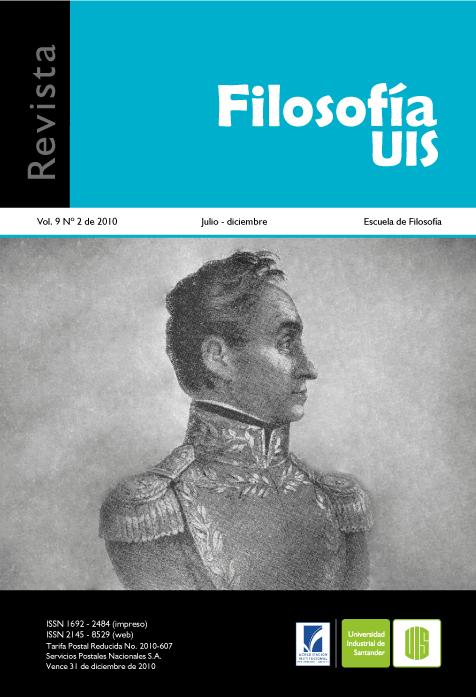Publicado 14-12-2010
Palabras clave
- foto,
- fotosintagmática,
- fotodinámica,
- fotovita
Cómo citar
Derechos de autor 2010 Manas Roy

Esta obra está bajo una licencia internacional Creative Commons Atribución 4.0.
Resumen
Así como en la fotosíntesis las hojas reciben su alimento a través de la luz del sol; la literatura recibe su material alimenticio subjetivo en la forma de nuevas ideas literales a través del mecanismo husserliano de époche ó fotomecanismo. —Una clase dinamismo de époche—. En una relectura de Edmund Husserl la noción de époche atraviesa Pheno→Foto→Palabra donde se pueden redescubrir nuevas dimensiones mediante la menisfestación de una nueva dimensión: Fenomenología→ Decostrucción→Déconcert, desde lo filosófico, podría explicarse como: "La teoría de sintagmas culturales por fotodinámicas al ser en sí misma literatura, hacer y actuar todo al mismo tiempo". Deconstrucción concertada es sólo un esfuerzo hacia la exploración de la metafísica resultante de la filosofía de la Deconstrucción derridiana en la era actual. Más allá de todo eso trata de un esfuerzo por repensar la fenomenología de Husserl con mayor cientificidad después de la Deconstrucción de Derrida hacia la apertura de nuevas dimensiones Deconcéntricas. Una de esa nueva clase de dimensión puede denominarse Fotofenomenología como una rama de la fenomenología en la escuela de Humanidades Concertivas.
Descargas
Citas
- Derrida, Jacques (1973). Speech and Phenomena, and Other Essays on Husserl’s Theory of Signs, trans. by David B. Allison. Evanston: Northwestern University Press.
- Derrida, Jacques (1976). Of Grammatology, trans. Gayatri Chakravorty Spivak: Johns Hopkins University Press.
- Dreyfus, Hubert (1982) Husserl, Intentionality, and Cognitive Science, Cambridge, MA: MIT Press.
- Dreyfus, Hubert & Rabinow, Paul (1983). Michel Foucault: Beyond Structuralism and Hermeneutics, Chicago: the University of Chicago Press, USA. Drummond, John “Noema and Meaning in Husserl,” Phenomenology and Philosophical Research, 50: 263-271.
- Husserl, Edmund (1931). Ideas: General Introduction to Pure Phenomenology. Translated by- Gibson, WRB. New York: MacMillan Co.
- Kolakowski, Leszek (1987). Husserl and the Search for Certitude, Cgicago: University of Chicago Press.
- Lawlor, Leonard (2004) Derrida and Husserl: The Basic Problem of Phenomenology in: The Review of Metaphysics, Vol.57.
- Norris, Christopher (1982). Deconstruction: Theory and Practice, London: Methven, 1982.
- Roudinesco, Elizabeth (2004). For What Tomorrow. A Dialogue with Jacques Derrida, Palo Alto: Stanford. University Press
- Roy, Manas (2008). “Derrida’s Philosophical Déconstruction”, Transcendent Philosophy Journal, Vol.9, Dec.2008 (237-246). Disponible en: http://iranianstudies.org/wp-content/uploads/2010/04/ Trans-Phil-Vol9-Dec-2008.pdf
- Roy, Manas (2010a). Concerting Déconstruction, Cambridge Scholars Publishing, U.K. http://www.c-s-p.org/Flyers/ Concerting-Deconstruction1-4438-2285-X.htm
- Roy, Manas (2010b). Phenomenological Existentialism, THINK, Vol.9, Issue 24, pp 51-63, Published by: The Royal Institute of Philosophy; Cambridge University Press, U.K. http://journals.cambridge.org/action/displayFulltext?type=1&fid=7191848&jid=THI&volumeId=9&issueId=24&aid=7191840
- Roy, Manas (2011). Concertölogy: The new Philosophy, Cambridge Sholars Publishing: Cambridge.
- Schütz, Alfred (1966). “The Problem of Transcendental Intersubjectivity in Husserl,” in Collected Papers III, The Hague: Nijhoff.
- Stephen W. Hawking (1992). A Brief History Of Time. Great Britain: Bantam Press.
- Stephen W. Hawking (1992). The Theory Of Everything. Phoenix Books.
- Stiegler, Bernard (2002). “Derrida and Technology: Fidelity at the Limits of Deconstruction and the Prosthesis of Faith,” in Tom Cohen (ed.), Jacques Derrida and the Humanities, Cambridge: Cambridge University Press.
- Ströker, Elisabeth (1993). Husserl’s Transcendental Phenomenology, Stanford: Stanford University Press.
- Thomas, Michael (2006). The Reception of Derrida: Translation and Transformation.
